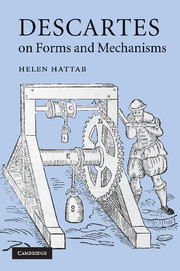Book contents
- Frontmatter
- Contents
- Acknowledgments
- List of abbreviations
- Introduction
- PART I RESURRECTING THE SUBSTANTIAL FORM
- PART II CHALLENGING THE SUBSTANTIAL FORM
- 4 Sanchez's skeptical humanist attack
- 5 The mechanical alternative to substantial forms
- 6 Cartesian science and the principles of Aristotelian mechanics
- PART III ELIMINATING SUBSTANTIAL FORMS
- Works cited
- Index
6 - Cartesian science and the principles of Aristotelian mechanics
Published online by Cambridge University Press: 15 September 2009
- Frontmatter
- Contents
- Acknowledgments
- List of abbreviations
- Introduction
- PART I RESURRECTING THE SUBSTANTIAL FORM
- PART II CHALLENGING THE SUBSTANTIAL FORM
- 4 Sanchez's skeptical humanist attack
- 5 The mechanical alternative to substantial forms
- 6 Cartesian science and the principles of Aristotelian mechanics
- PART III ELIMINATING SUBSTANTIAL FORMS
- Works cited
- Index
Summary
Descartes' replacement of substantial forms with mechanisms was itself the product of ‘long experience.’ In what follows I will argue that it proceeded in at least three distinct phases. At first Descartes presents himself as investigating the substantial forms of natural substances through a combination of reasoning and observation. These investigations lead him to articulate a new scientific method that rests on mechanical principles. Next, the explanatory success of his new method and principles makes the appeal to Scholastic physical substantial forms in scientific explanations redundant. Finally, in Part III, I will argue that the need to guard against arguments denying the very possibility of scientia by skeptics like Sanchez eventually led Descartes to embrace a controversial metaphysics to support his new mechanical science. As Descartes impatiently retorts in a letter to Plempius for Fromondus, dated October 3, 1637, this new science was directly inspired by the success of Aristotelian mechanics:
If my philosophy seems too ‘crass’ for him, because, like mechanics, it considers shapes and sizes and motions, he is condemning what seems to me its most praiseworthy feature, of which I am particularly proud. I mean that in my kind of philosophy, I use no reasoning which is not mathematical and evident, and all my conclusions are confirmed by true observational data. Whatever I concluded to be possible from the principles of my philosophy, actually happens whenever the appropriate agents are applied to the appropriate matter. I am surprised that he does not realize that the mechanics now current is nothing but a part of the true physics which, not being welcomed by supporters of the common sort of philosophy, took refuge with the mathematicians. […]
- Type
- Chapter
- Information
- Descartes on Forms and Mechanisms , pp. 120 - 154Publisher: Cambridge University PressPrint publication year: 2009



